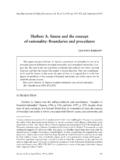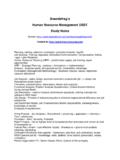Transcription of Getting Evidence into Policy-making
1 1 ANZSIG Insights Parliamentary Triangle Seminar Report Getting Evidence into Policy-making MEREDITH EDWARDS AND MARK EVANS Like any human venture, government can be full of error, fallibility and hubris. But the bigger danger for governments today is not excessive hubris but rather that they might succumb to the myth often propagated by a sceptical media that they are powerless, condemned to mistrust and futility. If they do so succumb, they will fail to rise to the great challenges, from climate change to inequality, that they alone can tackle. Geoff Mulgan, Director, Young Foundation. Proposition This article examines the case for Getting more Evidence into Policy-making .
2 It begins by evaluating the national and international contexts that have given rise to the latest renaissance in thinking on Evidence and policy . It then draws on contributions to the ANZSIG Parliamentary Triangle Seminar and companion papers, to identify four critical obstacles to the achievement of Evidence -based policy making in The article outlines a range of strategies for Getting Evidence into policy . It concludes by arguing that in most part Evidence -based Policy-making remains demand-led, and that developing and embedding a culture of strategic commissioning of Evidence at the level of political and permanent leadership is the fastest way of Getting Evidence into Policy-making and achieving more strategic government.
3 Here the SES has a particularly important role to play in championing Evidence -based Policy-making and forging strong working relationships with knowledge institutions through action learning processes which can help mitigate risk in public sector innovation, facilitate solutions to public policy problems and incubate ideas to support future decision- making . 1 We would like to take this opportunity to thank James Cameron (National Water Commission), Jonathan Lomas (Canadian Health Services Research Foundation), and Mary Ann O Loughlin, COAG Reform Council, for their contribution to the ANZSIG Parliamentary Triangle Seminar on Getting Evidence into Policy-making which was held at Old Parliament House on 29 March 2011.
4 2 Definitions The latest rediscovery of Evidence -based Policy-making may be viewed as part of a longer historical search for usable and relevant knowledge generated through rational scientific methods to help address and resolve social problems. This quest dates back to the enlightenment but finds its modern expression in the rational model of decision- making developed by Herbert Simon (1945) in the seminal Administrative Behavior (New York: Macmillan), and, Herbert Simon and James March s (1958) Organisations (New York: Wiley). Simon attempted to develop a theory of policy formulation which dealt with the processes of decision as well as with the process of action (1945, p.)
5 1). Simon argued that: ..rational decision- making involves the selection of the alternative which will maximise the decision maker s values, the selection being made following a comprehensive analysis of alternatives and their consequences. As Brian Head (2008, p. 2) notes, in more recent times, the aspiration for Evidence -based Policy-making in Australia is to produce the knowledge required for fine-tuning programs and constructing guidelines and tool-kits for dealing with known problems. Hence, the currently famous phrase that defines much of the movement what works? Domestic and international contexts The 2009 KPMG Benchmarking Australian Government Administration Performance report identified two areas in which it claimed that the Australian Public Service (APS) performs comparatively poorly or has an opportunity to strengthen:2 its capacity for coordinated, informed and strategic policy ; and its tools, methods and institutions for integrating external expertise and the views of citizens into the policy development and service design process.
6 In the subsequent report on the Reform of Australian Government Administration, Ahead of the Game, Terry Moran couched this problem in terms of the need to enhance policy capability: The APS needs to strengthen its capacity to undertake rigorous research, gather and analyse data and provide the highest-quality strategic policy advice. The reforms also propose a greater focus on policy implementation, through improved guidance, greater networking between service delivery agencies and implementation governance boards to oversee high risk projects. As Jonathan Lomas noted, this problem is not confined to Australia but appears to be a general malaise in Westminster style democracies.
7 Indeed his own organisation, the Canadian Health Services Research Foundation, emerged in response to the failure to integrate research and innovation into Canadian governance and politics and rising concern with the observation that many management and policy decisions were not based on research Evidence . Claudia Scott (2008) reports similar concerns in the New Zealand context in her paper delivered to the IPS Futuremakers Series in Wellington. The Blair government s 1999 Modernising Government White Paper represented an acknowledgement of the need to modernise policy and management at the centre of government.
8 It argued that Government must produce policies that really deal with problems; that are forward-looking and shaped by Evidence rather than a response to short-term pressures; that tackle causes not symptoms (Cabinet Office, 1999). The 2 Paradoxically, the Evidence base underpinning this report is far from Evidence -based . 3 Government s aspiration was given institutional expression through the creation of the Centre for Management and policy Studies which had a clear mandate both to establish more productive relations between government and academia in order to generate high quality Evidence -based research to inform practice and to consider the broader training needs of the civil service.
9 The Cabinet Office s (2001) Better Policy-making mapped out an Evidence -based approach to policy for achieving the former based on: reviewing existing research; commissioning new research; consulting relevant experts and/or using internal and external consultants and considering a range of properly costed and appraised options (CMPS, 2002). While the Cabinet Office s (2005) Professional Skills for Government programme dealt with the skills and training requirements of the civil service. There has subsequently been an explosion of intellectual and discursive activity around the Evidence -based practice approach in the UK including the establishment of the ESRC UK Centre for Evidence Based Policy-making and Practice at Queen Mary College, University of London and even an academic journal ( Evidence and policy ).
10 ANZSOG has recently followed suit with the announcement of the launch of a new journal, Evidence Base, under the editorship of George Argyrous at the University of New South Wales. It would be wrong, however, to suggest that no progress is being made in the Australian public service on these issues. Ahead of the Game has sharpened thinking on the institutional conditions necessary to facilitate an Evidence -based culture in Policy-making and operational delivery. And, of course this requires strong linkages with reforms which attempt to inspire public sector innovation. Nonetheless, it remains to be seen whether the SES will become key agents of change in this regard or simply pay lip service to what they perceive to be yet another public management fad.




